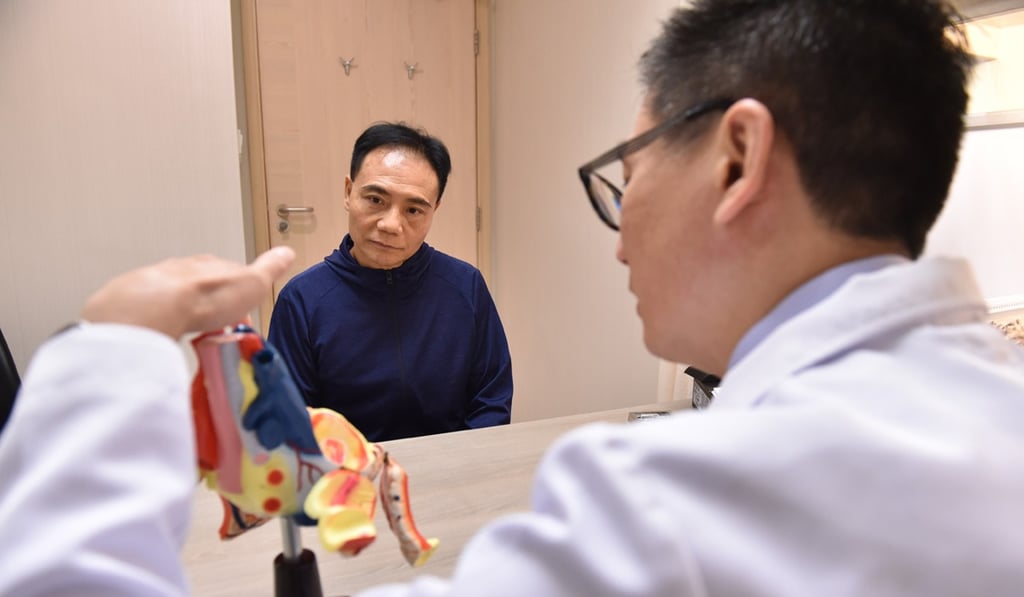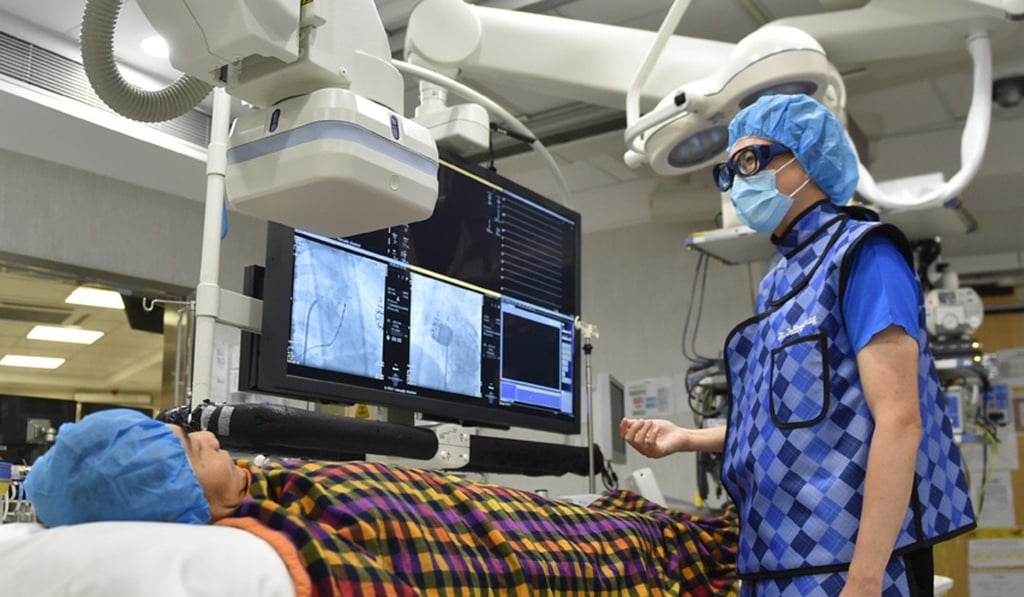How minimally invasive heart surgery helped keen marathon runner with life-threatening condition to get his ‘rhythm’ back
Yeung Yuk-kong’s abnormal heartbeat meant he ‘could have died at any time’, but feels like ‘new man’ thanks to Hong Kong Adventist Hospital – Stubbs Road

When keen marathon runner Yeung Yuk-kong visited a doctor at a private clinic five years ago he thought was just suffering from flu.
So, he was stunned to discover he had a life-threatening abnormal heart rhythm, which he says meant he “could have died at any time”.
My first run after surgery felt so good – it was even better than winning the lottery
The Hongkonger, 58, like many other people, had never heard of atrial fibrillation – a common condition that affects people aged 60 or over, which can cause problems such as strokes, blot clots and heart failure.
“My doctor checked my heart and told me my heart rate was only about 30 beats per minute,” Yeung says. Most adults have a resting heart rate of between 60 and 100 beats per minute.
“He then referred me to a cardiologist and I was diagnosed with atrial fibrillation – something I’d never heard of and knew nothing about.”
When electrical impulses misfire
An irregular heartbeat or pulse occurs when electrical impulses fire off from different places in the atria – the top chambers of the heart – in a disorganised way, which causes the atria to twitch.
This can affect the blood circulating into the ventricles – the heart’s lower chambers.
Most atrial fibrillation cases may involve a combination of symptoms such as an uncomfortable and irregular heartbeat in the chest, fatigue, reduced ability to exercise, light-headedness, dizziness, shortness of breath and chest pain.
However, 20 per cent of patients suffering from this illness have no symptoms at all.
For six months before his diagnosis Yeung says he had felt dizzy when waking up in the morning and also got tired easily whenever he went jogging – something he had been doing for more than 20 years.
Suffering from atrial fibrillation meant I could have died at any time. Since my surgery, I feel like a new man.
Yeung, who had often travelled around the world to take part in races, blamed the dizziness and fatigue on brain surgery, which he had undergone before to remove a benign tumour.
“My heart did not feel right at all,” says Yeung, who has always led a healthy lifestyle.
“I just felt dizzy much of the time. After I found out that I had the heart disease, I was told I couldn’t do anything and had to stop all my workouts, which wasn’t good.”
Condition affects 100,000 Hongkongers
It is estimated that there are about 100,000 people suffering from atrial fibrillation out of Hong Kong’s total population of about 7.44 million.
“In the past, most atrial fibrillation patients were elderly,” says Dr Jeffrey Fung, a specialist in cardiology at Hong Kong Adventist Hospital – Stubbs Road.
“Yet today there are an increasing number of younger patients suffering from this condition.”

It still remains unclear why there has been a surge in cases among the young.
“The risk of having a stroke is five to seven times greater for people suffering from this heart rhythm disorder than those with a normal heart rhythm,” Fung says.
To control Yeung’s problem, he was prescribed an anti-arrhythmic drug and blood thinner medication for a couple of months.
Electrical cardioversion – where the heart is given an electric shock to convert the irregular rhythm back to a normal heartbeat – was also carried out.
Referral to Adventist after no improvement
Yet the medication and shock treatment did little to improve Yeung’s condition, so he was referred to the Hong Kong Heart Centre at Hong Kong Adventist Hospital – Stubbs Road.
Now that I’ve recovered I believe I need to treasure every day – and live my life to the fullest
After carrying out a series of tests, Fung recommended that Yeung should receive a catheter ablation, the latest treatment for atrial fibrillation, to get rid of the tissue emitting the abnormal electrical signals to the heart.
During the treatment, carried out in the hospital’s Electrophysiology Interventional Laboratory, the doctor inserted catheters – thin and soft wires – into Yeung's heart via a blood vessel.
These catheters usually enter a patient's body through the groin or neck area after a topical anaesthetic has been administered.
Before my heart did not feel right at all. I just felt dizzy much of the time
Fung used electrodes on the tips of the catheters to conduct an electrophysiology study and find the source of the abnormal heart signals, then destroyed or blocked off the problematic tissue to stop it sending faulty electric signals to the rest of the heart.
Confidence about ‘minor surgery’
Yeung said he felt so confident about the procedure after Fung had clearly explained to him what it involved that he asked him to proceed as soon as possible.
Within a few days Yeung was in the hospital’s surgical theatre having the operation, which again involved the use of a topical anaesthetic and took about three hours to complete.
“While in the surgical theatre, Fung told me, ‘Everything will be fine: it’s just minor surgery so don’t worry’,” Yeung says.
“This made me feel very relieved – and also very confident about his abilities.”

With the help of the caring team of highly skilled medical professionals and the pleasant and safe environment of the hospital Yeung was able to return home after only a few days.
Once there, he was also keen to test his heart by going for a run.
“After the operation, I didn’t feel unwell at all, so I asked the doctor if I could start jogging within a week,” he says.
“But the doctor told me I should take it slowly, one step at a time.”
So Yeung waited for a month before putting on his sports shoes and going out for a gentle run in his local park.
First run ‘like winning the lottery’
“That first run after the operation felt so good – I jogged for about half an hour,” he says.
In the past, most atrial fibrillation patients were elderly. Yet today there are an increasing number of younger patients suffering from this condition
“I was so thrilled! It was even better than winning the lottery.”
Since then, Yeung has steadily increased the length and intensity of his exercise.
He is now able to run 10km (6.2 miles) each day – further than he was able to do in the past.
“I used to jog for 3km to 5km each day,” says Yeung, who also enjoys sports such as hiking, wakeboarding – riding on a short board resembling a surfboard and doing manoeuvres while being towed by a motorboat – and skiing.
“But since the surgery I feel my body is getting stronger so I can now run longer distances.
“I tried the medication and the cardioversion – neither of which helped much. But thankfully the catheter ablation made a huge difference.”
Yeung no longer has to take heart medication and needs to visit the hospital for check-ups only twice a year.
He is also back doing long-distance running again.
Last year, he took part in a 10km run in Osaka, Japan, and finished the race within an hour.
“I was not running hard to achieve a good time record, but simply enjoying taking part,” Yeung says.
The risk of having a stroke is five to seven times greater for people suffering from this heart rhythm disorder than those with a normal heart rhythm
“Despite having had various illnesses in my life, it felt great to know that I could still do it.”
He recently completed another 10km race in Da Nang, Vietnam, and his future plans include three trips to Japan – first to hike up Mount Fuji in November, then a skiing holiday in February followed by a 10km race in Tokyo in March.
“I really want to run a half marathon, but I know I need to build up my training gradually to do that,” he says.
“Suffering from atrial fibrillation meant I could have died at any time. But since my surgery, I feel like a new man.
“Now that I’ve recovered I believe I need to treasure every day – and live my life to the fullest.”